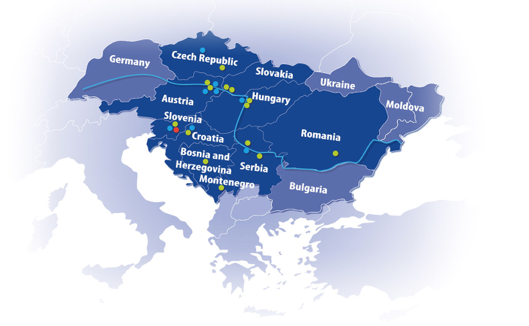Germ of Life project, to face the challenge of improving preventive management of drought risks in Euro-Mediterranean countries, takes into account a recent precedent in Europe: the DriDanube project, which was co-financed by the European Union through Interreg Danube Transnational Programme.
The main objective of the DriDanube project was to increase the capacity of the Danube region to manage drought-related risks. The project helped all stakeholders involved in drought management to be more efficient during emergency drought response and better prepare for the next drought.
Water shortages and droughts frequently hit the Danube region and have had major impacts on the economy and the well-being of the population. Despite the damage caused in recent decades, drought was still not considered a high priority issue and people were not aware of its impacts.
DriDanube has contributed to changing the perspective from crisis management to risk management. Established a new drought monitoring tool, DroughtWatch, for surveillance, early warning and emergency response. Early detection of drought impacts helps national authorities forecast and respond during drought development more quickly and accurately.
In practice, it also means that if farmers can see the immediate effects of drought and have relevant forecasts, they can take appropriate measures to reduce the impacts (for example, more efficient use of water for irrigation). Furthermore, using the information offered by this tool and the integrated drought management approach, governments can take the necessary measures before disasters bring irreversible losses and invest in prevention.
DriDanube’s Lead Partner was Slovenian Environment Agency (ARSO) and the partners were:
- Earth Observation Data Centre for Water Resources Monitoring GmbH (EODC), Austria
- Global Change Research Institute CAS (CzechGlobe), Czech Republic
- Global Water Partnership Central and Eastern Europe (GWP CEE), Slovakia
- Hungarian Meteorological Service (OMSZ), Hungary
- Vienna University of Technology (TU Wien), Austria
- Szent Istvan University (SZIU), Hungary
- National Meteorological Administration (NMA), Romania
- Centre of Excellence for Space Sciences and Technologies (SPACE-SI), Slovenia
- Meteorological and Hydrological Service (DHMZ), Croatia
- Slovak Hydrometeorological Institute (SHMU), Slovakia
- Faculty of Agriculture, University of Novi Sad (FAUNS), Serbia
- Republic Hydrometeorological Service of Serbia (RHMSS), Serbia
- Institute of Hydrometeorology and Seismology (IHMS), Montenegro
- Republic Hydrometeorological Service of Republic of Srpska (RHMZ RS), Bosnia and Hercegovina


